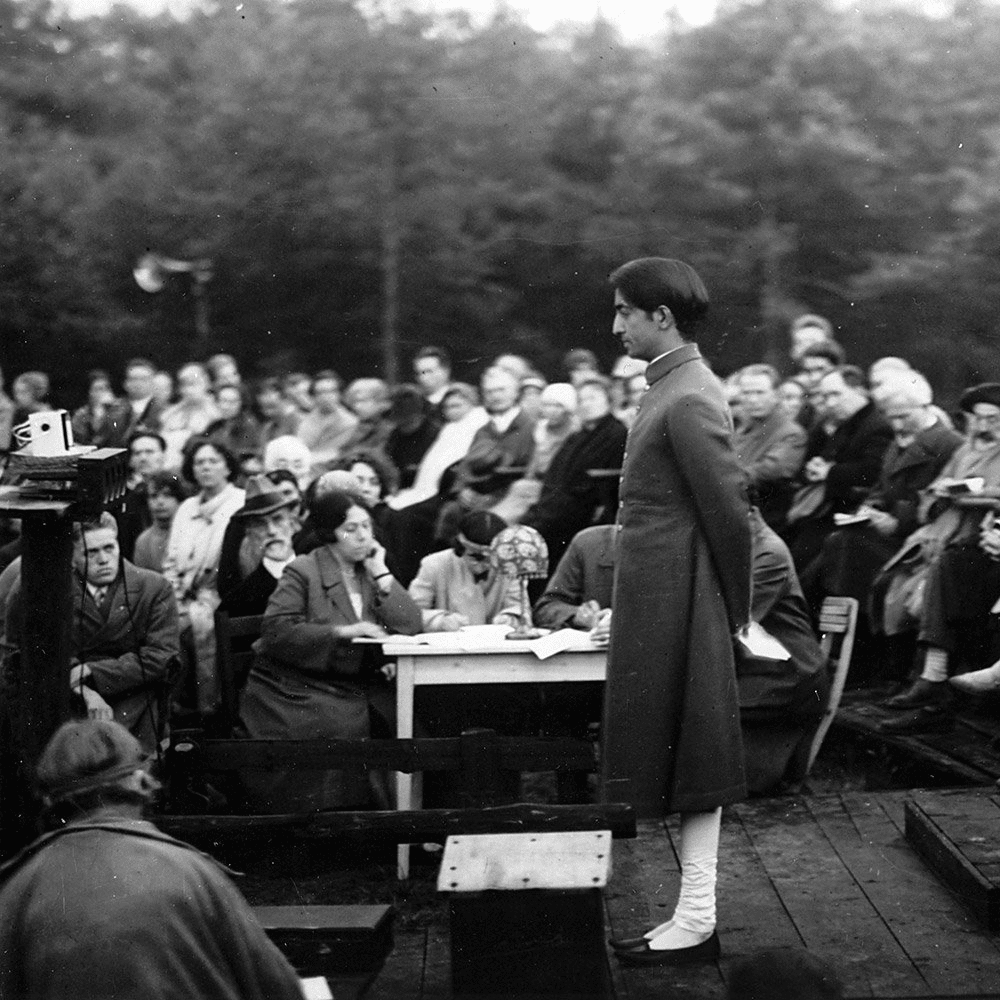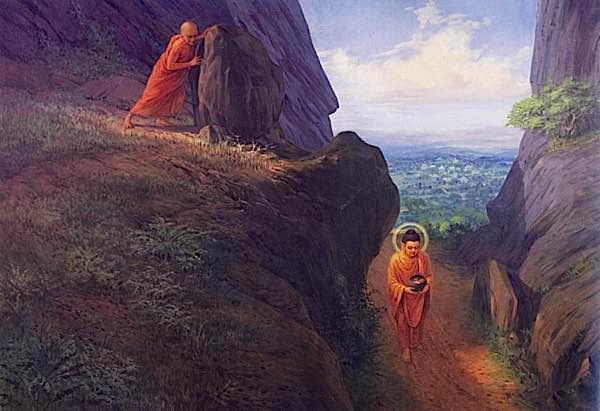The Meaning of Samadhi_
---------------------
---------------------
Asamprajnata samadhi is still sabeej - with seeds. And there are methods how to burn those seeds, how to create fire, how to burn the unconscious seeds. Then the soil is absolutely pure; then there is no birth, no death. Then the whole wheel stops for you; you have dropped out of the wheel. And dropping out of the society won't help unless you drop out of the wheel. Then you become a perfect dropout.
Even a Buddha is born. In his past life he attained to asamprajnata samadhi, but the seeds were there. He had to come once more. Even a Mahavira is born - once - the seeds bring him. But this is going to be the last life. After asamprajnata samadhi, only one life is possible. But then the quality of the life will be totally different because this man will not be identified with the body. And this man really has nothing to do because the activity of the mind has ceased. Then what he will do? For what this one life is needed? He has just to allow those seeds to be manifested, and he will remain a witness. This is the fire.
One man came and spat on Buddha; he was angry. Buddha wiped his face and asked, "What else you have to say?" The man could not understand. He was really angry, red-hot. He could not even understand what Buddha is saying. And the whole thing was so absurd, because Buddha didn't react. The man was at loss what to do, what to say. He went away; the whole night he couldn't sleep. How can you sleep when you insult somebody and there is no reaction? Then your insult comes back to yourself. You threw the arrow; it has not been received. It comes back: it comes back to the source finding no shelter. He insulted Buddha, but the insult couldn't find a shelter there. So where it will go? It comes to the original master.
The whole night he was feverish; he couldn't believe what has happened. And then he started repenting, that he was wrong - that he had not done good. The next morning, early, he went and he asked for forgiveness. Buddha said, "Don't be worried about it. I must have done something wrong to you in the past. Now the account is closed. And I am not going to react. Otherwise again and again... Finished! I have not reacted. Because it was a seed somewhere, it has to be finished. Now my account with you is closed."
In this life when a videha - one who has understood that he is not the body, who has attained asamprajnata samadhi - comes in the world just to finish accounts... His whole life consists of finishing accounts; millions of lives, many relationships, many involvements, commitments - everything has to be closed.
And they said, "For whom you are waiting now? Everybody is here; the whole village is here. You start." Buddha said, "But I have to wait because I have come for someone who is not here. A promise has to be fulfilled, an account closed. I am waiting for that one." Then came a girl, and then Buddha started. Then after he talked, they asked, "Were you waiting for this girl?"
Because the girl belonged to the untouchables - to the lowest caste, nobody could think of Buddha waiting for her. He said, "Yes, I was waiting for her. When I was coming she has met me on the road and she said, 'Wait, because I am going for some work to the other town. But I will come soon.' And in past lives somewhere I had given her a promise that when I become enlightened I will come and say whatsoever has happened to me. That account has to be closed. That promise is hanging on me, and if I can not fulfill it, I will have to come again."
A videha or a prakriti-laya: both words are beautiful. Videha means body-less. When you attain to asamprajnata samadhi the body is there, but you become body-less. You are no more the body. The body becomes the abode, you are not identified.
So these two terms are beautiful. videha means one who knows that he is not the body - knows, remember - not believes. And prakriti-laya, because one who knows that he is not the body, he is no more the prakriti - the nature.
Body belongs to the material. Once you are not identified with the matter in you, you are not identified with the matter without, outside. A man who attains that he is no more the body, that he is no more the manifested - the prakriti - his nature is dissolved. There is no more world for him; he is not identified. He has become a witness to it. Such a man is also born once at least because he has to close many accounts, many promises to be fulfilled, many karmas to be dropped.
Buddha says, "For you there is time enough. My time is over. And Devadatta has to do it. Some time back in some life there was some karma. I must have given him some pain, some anguish, some anxiety. It has to be closed. If I escape, if I do anything, again a new line starts."
A videha, a man who has attained to asamprajnata, does not react. He simply watches, witnesses. And this is the fire of witnessing which burns all the seeds in the unconscious. And a moment comes when the soil is absolutely pure. There is no seed waiting to sprout. Then there is no need to come back. First the nature dissolves, and then he dissolves himself into the universe.
So these are the two possibilities. If you have attained to asamprajnata samadhi in your past life, in this life you are born a Buddha - just a few seeds which have to be fulfilled, which have to be dropped, burned - almost. That's why I say you are born almost a Buddha. There is no need for you to do anything; you have simply to watch whatsoever happens.
He was taking a bath when he was just five years old near Adyar, and one of the greatest Theosophists, Leadbeater, watched him. He was totally a different type of child. If somebody was throwing mud on him, he will not react. There were many children playing. If somebody will push him into the river, he will simply go. Yes, he was not angry, he was not fighting. He has a totally different quality - the quality of an asamprajnata buddha.
Leadbeater called Annie Besant to watch this child. He is no ordinary child, and the whole Theosophical movement whirled around him. They hoped much that he will become an avatar - that he will become the perfect Master for this age. But the problem was deep. They had chosen a right person, but they hoped wrong - because a man who is born an asamprajnata buddha cannot even be active as an avatar. Because all activity ceased. He can simply watch; he can be a witness. You cannot make him very active. He can be only a passivity. They had chosen the right person, but still wrong.
And they hoped much. And then the whole movement whirled around Krishnamurti. And when he dropped out of it, said, "I cannot do anything because nothing is needed," the whole movement flopped because they hoped too much with this man, and then the whole thing turned out completely different. But this could have been prophesied.
Annie Besant, Leadbeater and others, they were very, very beautiful persons, but not really aware of the Eastern methods. They have learned much from books, scriptures, but they didn't know exactly the secret which Patanjali is showing: that an asamprajnata, a videha, is born, but he is not active. He is a passivity. Much can happen through him, but that can happen only if somebody comes and surrenders to him. Because he is a passivity, he cannot force you to do something. He is available, but he cannot be aggressive.
His invitation is for everybody and all. It is an open invitation, but he cannot send you an invitation in particular, because he cannot be active. He is an open door; if you like, you can pass. The last life is an absolute passivity, just witnessing. This is one way how asamprajnata buddhas are born from their past life.
This Forum message belongs to a larger discussion thread. See the complete thread below. You can reply to this message!
-
Expand this whole thread (6 messages)
Osho Yoga: The Alpha & The Omega Vol.2 turiya
4 d
105
turiya
4 d
105
-
The Meaning of Samadhi
 turiya
4 d
215
turiya
4 d
215
-
The Meaning of Samadhi_
 turiya
65 h
49
turiya
65 h
49
This is the position of the above message within the thread.
-
The Meaning of Samadhi
 turiya
64 h
121
turiya
64 h
121
-
Attraction to the Difficult
 turiya
38 h
116
turiya
38 h
116
-
Attraction to the Difficult_
 turiya
18 h
40
turiya
18 h
40
-
Attraction to the Difficult
-
The Meaning of Samadhi
CureZone Newsletter is distributed in partnership with https://www.netatlantic.com
Contact Us - Advertise - Stats
0.098 sec, (12)







